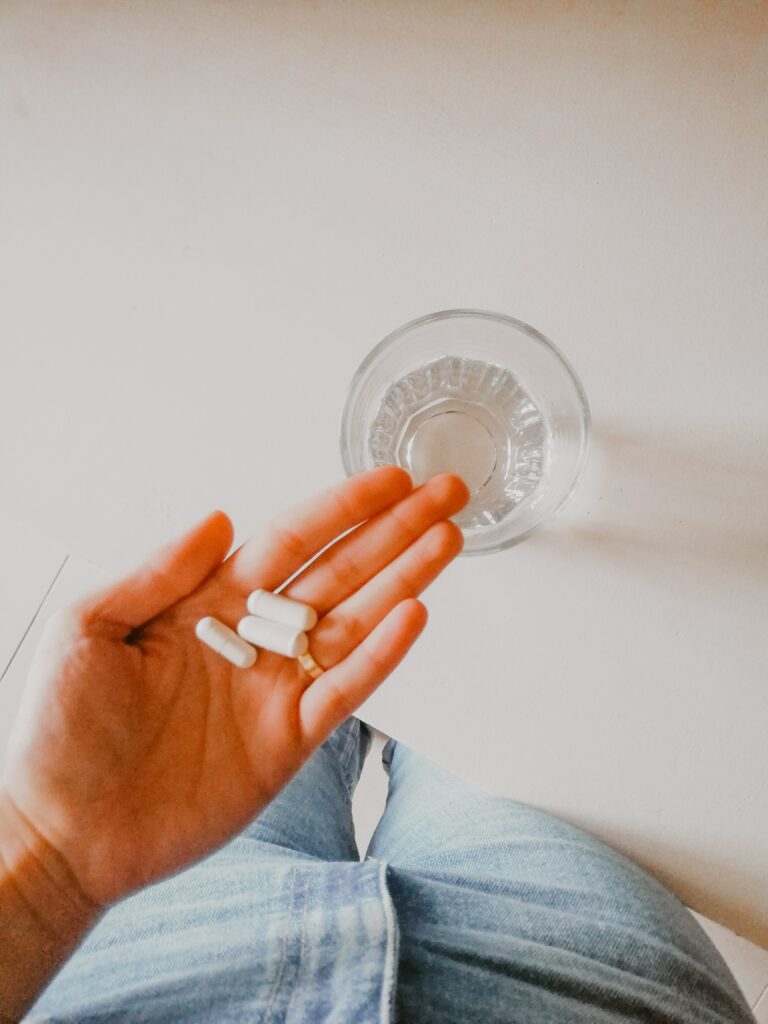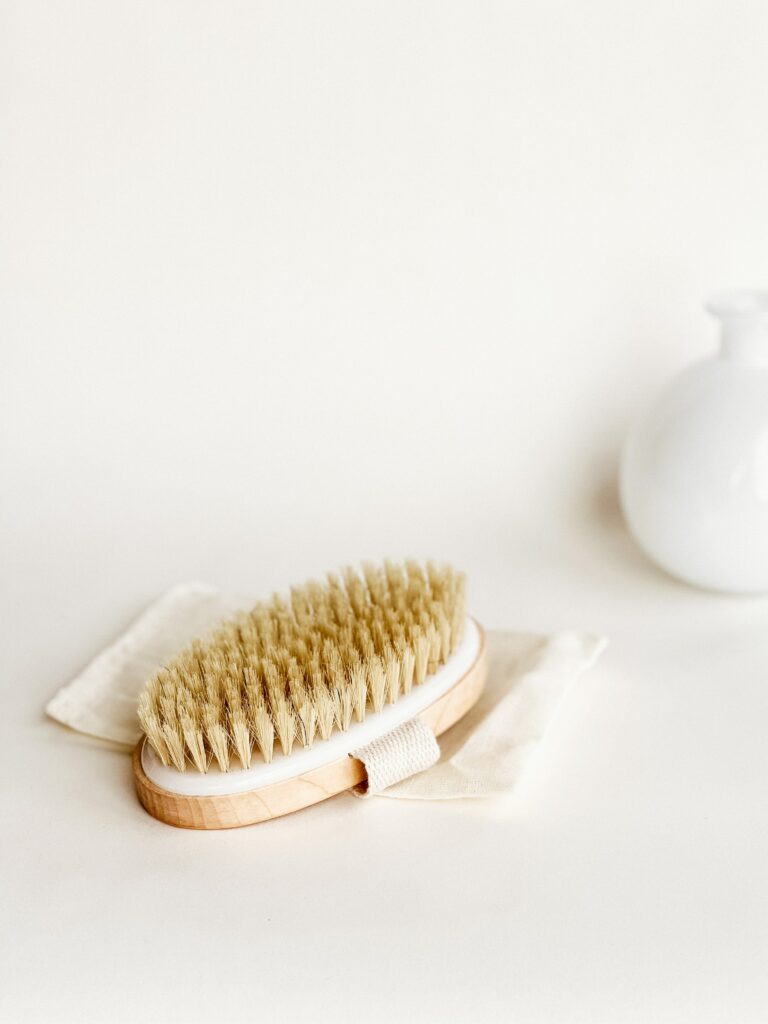You’ve committed to resolving your menstrual symptoms (good bye, pesky cramps!), but you don’t know where to begin. Or, you’ve recently been diagnosed with a hormonal imbalance, like PCOS. Or maybe, you’re keen on switching from birth control to natural family planning. At any rate, you’re ready to balance your hormones, naturally. Welcome! You’ve come to the right place. Unfortunately as women, we’ve been taught that suffering through crippling cramps, mood swings, skin woes, and intense cravings is normal. But I want to let you in on a secret: none of these scenarios are a normal part of womanhood. They are sneaky signs you probably have a hormonal imbalance. Today, I’m walking you through holistic remedies for PCOS and irregular periods.

do you have a hormonal imbalance?
This goes without saying, but hormone health is vital to our well-being. Throughout every stage of life, hormones play a role. They regulate everything from growth to sex drive, reproduction, metabolism, and more. Produced in the endocrine glands, they help control what (and when) certain bodily processes happen. Although very powerful, they’re equally sensitive. Hormones are easily influenced by lifestyle factors: diet, exercise, stress, sleep, and medication. One—or all—of these factors can throw your hormones out of balance. And this imbalance takes a toll. For example, do you experience irregular or painful periods, tender breasts, digestive issues, and / or poor sleep? If so, you may have an underlying hormone imbalance.
HOW COMMON IS HORMONAL IMBALANCE?
Very. These days, hormone irregularities are remarkably common. In fact, studies show that upwards of 80% of women suffer from hormone imbalances. PCOS, for example, affects approximately 5 million women in the United States. Including myself. That makes this condition one of the most common hormonal endocrine disorders among women of reproductive age. In essence, when you have a hormonal imbalance, you have too much or too little of a particular hormone. When your endocrine glands don’t secrete enough (or too much) of a particular hormone, things go awry. From high cortisol to low testosterone, fluctuations in hormone levels are usually a result of lifestyle factors. And while hormone levels are supposed to fluctuate throughout your lifetime (hello, pregnancy!), chronically high or chronically low levels wreak havoc.

WHAT ARE COMMON PCOS SYMPTOMS?
This varies. It’s important to know that name polycystic ovary syndrome is a bit misleading. It describes the numerous small cysts (fluid-filled sacs) that form in the ovaries. However, some women with PCOS don’t have cysts. Below are general PCOS symptoms:
- Irregular periods or rarely having a period
- Abnormal hair growth, such as lip hair, stomach hair, neck or facial hair (conversely, some women experience male balding patterns)
- Acne
- Infertility, due to anovulation
- Tendency to being overweight, particularly with weight in the abdomen
- Insulin resistance with signs of diabetes
- Blood sugar regulation issues
- High testosterone
- Via ultrasound, one or both ovaries are enlarged with many immature eggs
Unfortunately, there is no single test for PCOS, and it’s difficult to diagnose. Typically, a physical exam, ultrasound, and blood tests can help diagnose PCOS. You need to meet two of these three official criteria to be diagnosed: irregular, heavy, or missed periods due to missed ovulation; higher levels of androgens are present in the blood (hyperandrogenism); an ultrasound shows polycystic ovaries.
Holistic remedies for PCOS and irregular periods
Healing from a hormone imbalance is not linear. Ultimately, consistency and commitment are key. How to balance your hormones, naturally, is all-encompassing. It includes lifestyle, diet, and supplements for hormonal imbalance. High level, you want to focus on an anti-inflammatory, nutrient-dense diet, remove endocrine disruptors and inflammatory oils, incorporate stress relief habits, and take the necessary steps to get your gut health on track. Finding a balance with exercise is important, too. Take the following holistic remedies for PCOS and irregular periods with a grain of salt. Ultimately, consider working with a healthcare practitioner to balance your hormones, naturally.
1. Focus on nutrient-dense foods
Rather than approach food from a diet mentality, consider healing your irregular periods / PCOS with a focus on balanced blood sugar and eating enough. Ultimately, the right nutrition can be tremendously beneficial for balancing hormones. After all, what you eat is either helping or hurting your hormones. You diet plays a significant role in hormonal production (and maintaining healthy hormonal balance!). Eating nourishing foods—and the right balance of these foods—can ensure happy hormones. Au contraire, consuming too many inflammatory oils, processed foods, and sugar can cause imbalances. Not to mention, not eating enough food can easily put your period on pause. Food is fuel, pleasure, joy, and culture, but it’s also medicinal. Use it to your advantage to bring your body into balance. Curious about eating gluten and dairy? See here. And what about coffee? See here.

2. incorporate seed cycling
Have you heard of seed cycling? This hormone-supporting tool is one of the top trending wellness practices (and for good reason). This simple practice helps support balanced hormone levels, reduces PMS symptoms, boosts fertility, and can help stimulate menstruation—if it’s absent. Learn how to seed cycle, here. In essence, you alternate between ground pumpkin + flax seeds and ground sesame + sunflower seeds throughout the course of the month. Funk It Wellness takes the guesswork out for you! Buy your seeds and get started on your seed cycling journey.

3. take the right supplements
Supplements can be incredibly useful for not only filling gaps in your diet, but also helping you reach optimal levels for balanced hormones. My supplement guide is here to do both. In addition to seed cycling, below are my recommended supplements for hormonal imbalance. However, please consult your physician or healthcare provider before making changes to your supplement routine.
VITAMIN D / K2
Did you know that vitamin D is actually a hormone? The more you know! Every cell in the body has a receptor for vitamin D. Vitamin D is responsible for hormone health, immune regulation, absorption of calcium and phosphorus, maintenance of healthy bones, and protection against multiple diseases. Research shows that more than 100 million Americans are deficient in vitamin D. At any rate, it’s essential to help balance hormones. As a fat-soluble vitamin, take it with your fattiest meal of the day to ensure absorption. Or, take your vitamin D and your fish oil supplement together. Last but not least, vitamin K2 is ideally taken with vitamin D, as vitamin K2 is the key to bone health. It helps to ensure vitamin D gets to your bones.
VITAMIN D SUPPLEMENT
B VITAMINS
The B vitamin family consists of B1 (thiamine), B2 (riboflavin), B3 (niacin), B5 (pantothenic acid), B6, B7 (biotin) and B12. Each B vitamin has a different function: reducing inflammation, supporting hormonal function, supporting nerve and heart health, and maintaining a healthy metabolism and digestive system. A B12 supplement, specifically, is important for plant based-eaters. Low levels of B12 can cause extreme fatigue, anemia, numbness, and more. Below is my favorite supplement for B vitamins. It provides a whole-food source of all eight B vitamins + choline, inositol, and PABA. This supplement helps support and balance your energy, metabolism, mood, and nervous system. Plus, it’s made with certified organic ingredients.
B VITAMIN COMPLEX SUPPLEMENT
OMEGA-3 FATTY ACID (FISH OIL)
Due to large doses of industrial seed oils, most Americans are over-consuming omega-6 fatty acids. We now have an average inflammatory ratio of 15:1 (omega-6:omega-3), instead of the ideal 1:1 ratio. To combat this, it’s helpful to include an omega-3 supplement. The best omega-3 comes from fish oil, like cod liver oil. Omega-3 fatty acids are the starting point for making hormones that regulate everything from blood clotting to inflammation. They’re also a wonderful source of lignans—compounds that may have a weak estrogen effect.
OMEGA-3 FISH OIL SUPPLEMENT
MAGNESIUM
Magnesium is a cofactor in more than 300 enzyme systems that regulate diverse biochemical reactions in the body. This includes calming the nervous system, improves blood sugar balance, activates vitamin D, supports thyroid health, and can help minimize PMS.
MAGNESIUM SUPPLEMENT
PROBIOTIC
Last but not least, consider adding a spore-based probiotic to your supplement routine (especially if you don’t eat fermented foods, dairy, etc.). Roughly 80% of our immune system is located in our gut. Supporting its health is key. Unfortunately, our gut’s delicate ecosystem can be broken down by a number of influences—antibiotics, stress, sugar, and chemicals. Consuming probiotic-rich foods—like sauerkraut, yogurt, and kimchi—as well as supplementing with probiotics can support your digestion, hormones, and more.
PROBIOTIC SUPPLEMENT

4. DON’T OVEREXERCISE
Too much exercise is not a good thing! Due to overexercising and under-eating, many women don’t have enough body fat to sustain a menstrual cycle. In other words, having a naturally occurring period is significantly correlated to exercise. Having it is an indicator that the amount / intensity of your exercise routine isn’t creating too much stress on your body. On the other end of the spectrum, not prioritizing any exercise isn’t helpful either. We need movement for healthy bowel movements, balanced blood sugar, heart health, stress management, and more. Find joyful ways to move your body and your hormones will benefit—walking, strength training, swimming, yoga, etc. Consider if your current workout regime is leaving you weak, lethargic, hangry, or energized, uplifted, and strong.

5. remove endocrine disruptors
Unfortunately, there is no shortage of pesky ingredients in household items and skincare products. In fact, most of us aren’t aware of how many we’re exposed to—as in like, 80,000 chemicals, every day! Over time, these unnatural ingredients wreak havoc on hormones. They also impact longevity and blood sugar. The fewer we come in contact with, the better. There’s a laundry list of endocrine disruptors out there, but you can find a short list, here. Begin removing / swapping your skincare, household items, and cleaning products ASAP.

6. Get quality sleep
No surprise here. Sleep is instrumental in balancing hormones (among other things!). It gives the body adequate time to repair, rejuvenate, and naturally detox. Research shows that poor sleep (disrupted sleep, clocking less than seven hours, etc.) negatively impacts hormonal rhythms and metabolism. Chronic sleep issues can lead to obesity, insulin insensitivity, diabetes, and more. Create a peaceful, grounding bedtime routine and your hormones will thank you.

7. dry brush for lymphatic drainage
First and foremost, what is dry brushing? Dry brushing is the act of using a naturally-bristled brush to massage the body. With Ayurvedic roots, this type of self-care has been around for thousands of years. Like most things in the body, the lymphatic system can highly affect your hormones. If your lymphatic system isn’t draining properly, vital hormones can get stuck where they don’t belong. In turn, causing imbalance. Since dry brushing supports lymphatic drainage (like castor oil packs!), it also promotes healthy hormone circulation. Furthermore, dry brushing is an excellent opportunity to practice self-care and relaxation. Taking time out of your day to dry brush your skin can leave you feeling grounded, relaxed, and balanced.

Hormone balance ebook
Ready to take the next step in your hormone-healing journey? Grab your copy of Master Your Menstrual Cycle—my holistic guide to balancing your hormones with ease. Available for only $15!
Keep in mind that these home remedies for PCOS and irregular periods are general recommendations. This article is for informational purposes only. It is not, nor is it intended to be, a substitute for professional medical advice, diagnosis, or treatment and we recommend that you always consult with your healthcare provider.



Leave a Reply